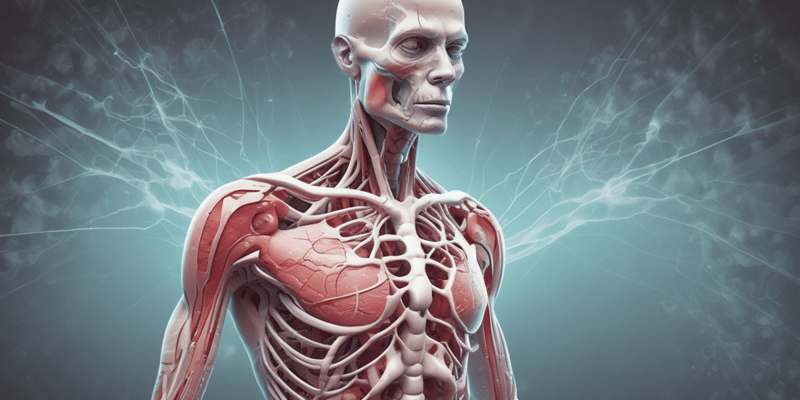Questions and Answers
What level of calcium defines hypercalcemia that requires urgent action?
Which of the following is NOT a symptom of hypercalcemia?
What should be done if hypercalcemia is caused by excessive calcium intake?
Which condition is associated with the excessive secretion of parathyroid hormone (PTH)?
Signup and view all the answers
What is a common treatment approach for hypercalcemia related to increased absorption?
Signup and view all the answers
Which of the following is a cause of hypercalcemia?
Signup and view all the answers
What complication may arise from untreated hypercalcemia?
Signup and view all the answers
Which of the following measures should be taken to avoid complications of hypercalcemia?
Signup and view all the answers
What is the primary function of calcium in the body?
Signup and view all the answers
What is a potential consequence of excessive urination?
Signup and view all the answers
Which of the following is NOT a recognized function of calcium?
Signup and view all the answers
In the context of hypo and hypercalcemia, what risk is associated with these conditions?
Signup and view all the answers
Thiazide diuretics are primarily prescribed for which of the following issues?
Signup and view all the answers
Safety precautions such as call bells and bed alarms are particularly important for patients at risk of what?
Signup and view all the answers
What is the normal range for serum calcium levels?
Signup and view all the answers
What relationship do calcium and phosphate have?
Signup and view all the answers
Study Notes
Electrolyte Imbalances: Calcium Imbalance
Hypercalcemia
- Defined as calcium levels greater than 11 mg/dl, requiring urgent medical action.
- Symptoms include:
- Bone Pain: Discomfort in the skeletal system.
- Arrhythmias: Abnormal heart rhythms potentially leading to serious complications.
- Cardiac Arrest: Critical condition marked by the heart not pumping blood.
- Kidney Stones: Formation of stones due to excessive calcium.
- Muscle Weakness: Reduced strength in muscles.
- Excessive Urination: Increased frequency of urination.
Causes of Hypercalcemia
- Excessive Intake: Overconsumption of calcium-rich foods or supplements, including antacids like TUMs.
- Increased Bone Resorption: Conditions such as hyperparathyroidism leading to excess parathyroid hormone (PTH) secretion.
- Malignancy: Cancer induced bone destruction increases calcium levels.
- Increased Absorption: Situations involving thiazide diuretics or kidney disease.
Treatment for Hypercalcemia
-
If Due to Excessive Intake:
- Implement adequate hydration to prevent kidney stones.
- Discontinue calcium supplementation and avoid high calcium foods.
-
If From Increased Absorption:
- Stop thiazide diuretics and avoid high calcium foods.
- Dialysis can be a last resort in severe cases.
Function of Calcium
- Essential for muscle contractions, bone formation, blood clotting, and hormone regulation.
- Normal calcium range is 9-11 mg/dl, with an inverse relationship to phosphate (P).
Additional Notes
- Patients with calcium imbalances are at risk for pathological fractures, making safety precautions crucial (e.g., call bells, bed alarms).
- Mnemonic to Remember Symptoms: "BACKME" (Bone pain, Arrhythmias, Cardiac arrest, Kidney stones, Muscle weakness, Excessive urination).
Studying That Suits You
Use AI to generate personalized quizzes and flashcards to suit your learning preferences.
Description
Test your knowledge on hypercalcemia, its symptoms, causes, and potential health risks. Understand how excessive calcium levels in the body can lead to serious complications and what factors contribute to this condition. Perfect for healthcare students and professionals!




